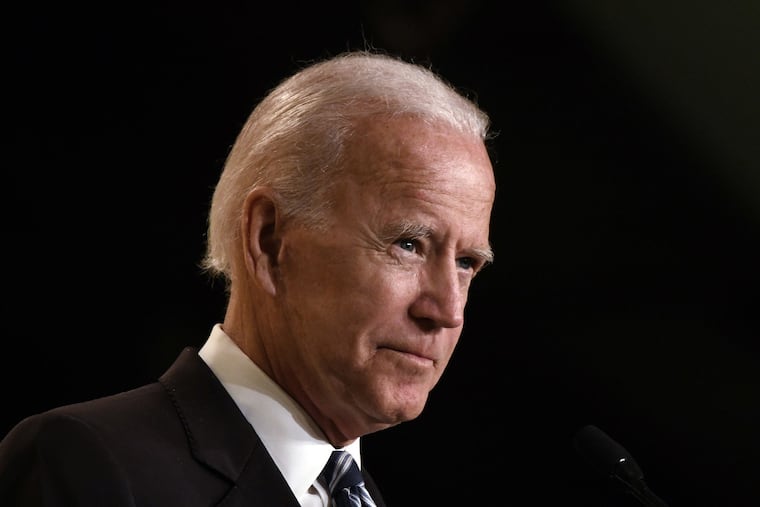The qualities that made Joe Biden an effective running mate in 2008 hurt his 2020 presidential bid | Opinion
In order to win the presidency, Biden needs to shed the very attributes and talents that once placed him a heartbeat away from it.

Joe Biden’s high-profile flip-flop on the Hyde Amendment last week, and his subsequent dip in the polls is the most recent manifestation of an uncomfortable truth that continues to encumber his presidential campaign. Biden’s reputation, experience, and style compelled Barack Obama to choose him as a running mate in 2008, yet the same traits risk losing him the Democratic nomination.
It only takes a brief look back at the 2008 vice presidential nomination process to recall why Biden was such a widely lauded pick. The ideal running mate is one that fills perceived gaps and weaknesses in the presidential candidate’s personality and background, and Biden delivered precisely that to the Obama campaign.
Where Obama was seen as an outsider who had spent less than half of a term in the United States Senate, Biden was a congressional institution. His large Rolodex and deep knowledge of domestic and foreign policy-making alleviated concerns that Obama’s greenness would prevent him from getting things done if elected. When Obama was attacked for being part of the liberal elite, Biden provided working class credentials. Obama’s demeanor was at times described as overly measured, stoic, arrogant and aloof. Biden could joke, hug, and back-pat his way through a rope line as if attending a family reunion. Who could forget what Biden whispered to President Obama after perhaps the most historic moment of his presidency, the signing of the Affordable Care Act into law: “This a big f*****g deal!”
More than 10 years later, Biden’s earthy charm and improvisations are liabilities rather than strengths for his own presidential campaign. Even before announcing his 2020 White House bid, Biden’s propensity for “tactile” politics became the subject of intense scrutiny when two women accused him of unwanted touching. As allegations piled up, Biden released a video promising to change his behavior but avoided providing a full-throated apology. Just two days later, Biden made light of the controversy while speaking at a conference, joking that he received “permission” to touch and embrace people on stage.
Biden’s long record in Washington is similarly tainted by his treatment of Anita Hill as chairman of the Senate Judiciary Committee during the Clarence Thomas hearings, his support of tough-on-crime legislation that lengthened prison sentences in the 1990s, and his sponsorship of an antibusing amendment that limited the racial integration of schools.
Biden has aged along with some of his policy positions. The years of amassed expertise the Obama campaign was so eager to acquire in 2008 have now been eclipsed by charges that Biden, who would take office at the age of 78 if elected, is too old to be president. Assertions that the former vice president has not traveled as much nor held as many campaign events as his opponents contribute to the image of a rudderless and disorderly campaign and have inspired President Trump to give Biden the nickname “Sleepy Joe.”
There are still many substantive reasons to believe that Biden will clinch the 2020 Democratic nomination. High name recognition, as research in my forthcoming book about celebrity candidates shows, is essential in large primary field. While lesser-known candidates drain resources and fight over slivers of media coverage in hopes of introducing themselves to voters, front-runners like Biden enjoy built-in familiarity and popularity.
But fame does not give the Biden license to wing it, and “been there, done that” is not sound campaign strategy in a presidential election climate that has been hostile to establishment politicians for decades. While some might argue that the election of Donald Trump demonstrated the willingness of many Americans to ignore the personal shortcomings of candidates, as well as the value of gut-level instinct over calculated strategy, Trump’s victory was razor-thin.
Instead, each of Biden’s missteps raises the question of whether someone with a fresher face and cleaner record on key issues like racial and gender equality would not be a better choice for the Democratic Party in 2020, especially if the central strategy Democrats plan to deploy is to draw a stark contrast between their nominee and Trump.
In order to win the presidency, Biden needs to shed the very attributes and talents that once placed him a heartbeat away from it. After all, what could present a clearer departure from the Trump White House than a principled, focused, and unbelligerent campaign?
Lauren A. Wright is a lecturer in Politics and Public Affairs at Princeton University. Her newest book “Star Power: American Democracy in the Age of the Celebrity Candidate” will be published by Routledge in August. @drlaurenawright